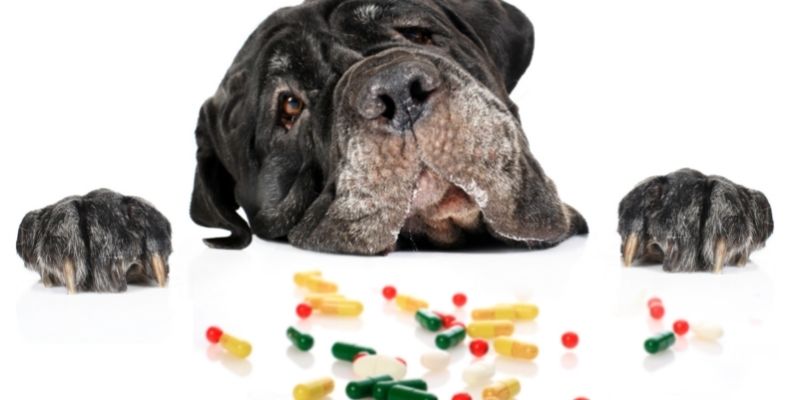Antibiotics are the go-to option when your dog suffers from any bacterial infection. It can be diarrhea, UTI, or any other bacterial infection. Stud owners or male dog owners often ask -Do antibiotics affect sperm in dogs?
As a dog parent who has nourished multiple dogs, I have also asked the question several times. I know a lot of you would want to see a litter of your stud dog sometimes.
So, here is your answer to the question of whether antibiotics have any effect on sperm in dogs-both yes and no! Antibacterial medicines or antibiotics can have no impact, a positive effect, or reversible adverse effect on male dog fertility and sperm quality.
Do you have a specific question about antibiotics affecting sperm in dogs? Then use the table of contents below to jump to the most relevant section. And you can always go back by clicking on the black arrow in the right bottom corner of the page. Also, please note that some of the links in this article may be affiliate links. For more details, check the Disclosure section at the bottom of the page.
Here's what we'll cover:
How antibiotics affect fertility in male dogs?
Well, there are different effects of antibiotics in male dogs. While some antibiotics do not affect at all, others may hamper their overall sexual health including their semen quality.
In general, the medicines start to affect the semen quality of the pup after two months. It is the duration that your dog requires to produce new sperms. So, there are chances that if your dog takes antibiotics for two months or for a prolonged time, their sperm quality may be affected.
Antibiotics that have no effect on sperms
Antibiotics like amoxicillin do not interfere with sperm production in male dogs. Research showed that clavulanic acid-potentiated Amoxycillin medicines do not deteriorate sperm even after prolonged use. The researchers also recommended that dogs can safely consume nearly twice more than the manufacturer recommended dosage. The research also showed that the sperm count did not drop in dogs that took the medicine for 28 days, twice per day.
Hence, if your stud dog is undergoing a course of amoxicillin, you do not need to worry. Your pet can father healthy puppies after mating with a healthy bitch.
Antibiotics that have a reversible adverse effect
Researchers are still looking for more information on the question- of do antibiotics affect sperm count in male dogs?
A few antibiotics may affect sperm quality and quantity after prolonged use. Some medicines may also affect the speed and movement of the sperm a dog produces. The sperms may move slower as a side effect of the drugs.
Doctors and researchers have theorized that medicines like erythromycin, ketoconazole, Macrobid, Gentamicin, Neomycin, etc. can affect the sperm quality in male dogs.
But the effect is mostly temporary. Your dog may not produce quality sperm while on the medication. But in general, the effects of these medicines stop three months after the course is complete.
Hence, if your dog is undergoing any of the medicines mentioned above, wait for three to four months after the course ends. Breed after at least a hundred days of withdrawing the treatment. Your dog’s fertility may become normal by that time.
The research was done on a male American Staffordshire, suffering from Malassezia dermatitis. Due to the recurring infection, the vet recommended Ketonidazole for three months. The dog had decreased libido even after the medication ended. After forty days, this dog displayed azoospermia or a complete absence of sperm in the semen.
After hundred days, when ketonidazole was withdrawn, the dog displayed improvement. His semen had a healthy inadequate level. On top of that, his testosterone level also became normal.
Medicines like Ketonidazole may affect the dog’s fertility during the medicine course and after the course ends. But the condition is reversible, and the male dog will have healthy sperm after three to four months of withdrawing the medicine.
Do antibiotics help dogs suffering from fertility problems?
Is your stud dog suffering from fertility problems? The dog may have mated with many females but cannot impregnate the bitch.
Research shows that bacterial diseases can affect sperm count and sperm quality in male dogs. For example, UTI or urinary tract infection, or E. coli infection in males can result in temporary infertility. In some cases, prostate gland infection and other infections may also adversely affect the sperm quality of your doggo.
Your pet may produce dead sperms, low-quality sperms, or a lower level of sperms (oligospermia) due to the infection.
In such cases, antibiotics like ciprofloxacin can help to cure the cause of infertility and poor sperm condition. However, if your dog suffers from any such disease, it is better to take him to the vet. The doctor will examine your pet’s condition and administer medications for two to four weeks.
After the infection is cured, your dog may start to produce healthy sperms slowly and will be able to breed successfully. In addition, it will display better sperm quality after three months of the medication course.
So, do antibiotics affect sperm in dogs? Yes, a few medicines like Ketonidazole may affect the sperm quality during the medication. But, the condition reverses after three to four months. Hence, check out your pet’s medicines and wait for some time to ensure they are healthy again to produce healthy sperm.
Thanks for the blog graphics: Canva.com

Thanks for the blog graphics: Canva.com
Doghint.com is a participant of several affiliate programs. The list includes (but not limited to) the following: VigLink, Refersion, ShareASale, and Amazon Services LLC Associates Program, an affiliate advertising program designed to provide a mean for us to earn fees by linking to Amazon.com and affiliated sites. Doghint.com does not intend to provide veterinary advice. All published articles are meant for informational purposes only and not substitute the professional veterinary consultation.


